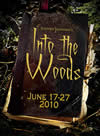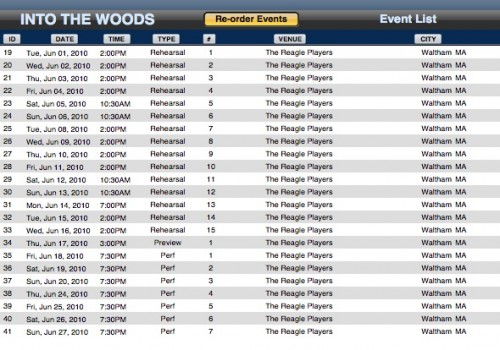Today marks the official start of my contract for The Acting Company 2010-2011 tour. We start rehearsal a week from today. I celebrated by getting up at 6:30 for a day in the office. The good news is, I’m actually getting paid now. The other good news is that it’s pumpkin spice latte time at Starbucks, and that made the second half of my day awesome.
In the Office
Almost the entirety of my day today was spent on the script. What is believed to be the final draft of the first rehearsal script came back from the director early this morning. So with something we think we might actually be distributing, I went through it with a fine-toothed comb, removing all the multicolored notes and strikethroughs from all the people who had been collaborating on it, renumbering the pages, and making the formatting absolutely perfect, checking every single character, space and margin, as well as reading every word for content to make sure there weren’t any obvious errors.
I’m very happy to know that is under control, and it’s exactly how I want it set up. I initially lobbied to keep the old page numbers in case our returning actors and staff wanted to use their old scripts, but I was convinced that we should encourage people to start from scratch. Both scripts have the act & scene number as part of the page number, so even if people are using their old scripts, they can still turn to the correct page or very close to it, as most scenes are only a few pages long. Some cuts have been put in, but they’re relatively small. It should make the show feel a little faster without removing too much content.
I was given control of the contact sheet today, although with the priority put on getting a final script ready today, I wasn’t able to finish double-checking the contact sheet I’ve been working on in my database against the final one from the office. Other than a little bit of work on that, I participated in a few discussions about travel, the early rehearsal schedule, and the technical education workshops I’ve been trying to get going this year. It’s nice to be in the middle of the action as things are coming together.
Remounting
This is the first time in a long while that I’ve remounted a production I’ve done before. Definitely the first time on a production of this scale, keeping the same design elements, and on which I knew at the time of the previous production that I would need to recreate the show again. It’s kind of fun.
When I found out that I would be spending the day on the script, it was pretty daunting to get started. Since April I hadn’t done more than glance at the script when I’d been asked to submit my copy of the final script about a month ago. This is a three-hour show that I did 82 performances and 30 days of rehearsal of within the past nine months. I thought I would be sick of staring at those words. But it was actually very comforting. There’s definitely something nice about doing a show you know. As I read through the script, I heard the whole show in my head as performed by my friends from last year, and enjoyed the memories of my favorite moments, or funny things that happened during the process surrounding certain parts. I was sad to think that some of those people would be gone, but curious to see what new people will bring to those roles. And I’m looking forward to seeing our returning actors’ performances again, and to see what they may discover that’s different this time.
After reading literally every word, I definitely feel like I have the show back in my body. The more I can remember and see the show in my mind, the easier my job will be, and the less I’ll have to worry about being able to make sense of my paperwork!
After Hours
Tonight, theoretically I’m watching football, but I’m not really, I’m working and blogging. I’m scanning a few paper documents that I was given today: the rules packet for New 42nd Street Studios, and the Letter of Agreement (LOA) between the company and Equity, which modifies our rehearsal rules (which are based on the LORT agreement). I have never in my years of stage management been able to get a digital copy of an LOA. No general manager I’ve worked with has ever been given one in their lives. So I always have to scan it, because having the printed copy with me when I need it never works out. Needing it at the bar at 1AM is just as likely as needing it in rehearsal or at my apartment when I wake up in the morning. When I’m done scanning I will upload the PDFs into Evernote and put them in my DropBox, where Meaghan and I can reference them.
By the by, I really wish I had a scanner that was less than 8 years old, and that I didn’t have to use Windows to use. But it’s just one of those things that I’d hardly ever be home to take advantage of. We do tour with a printer/scanner combo thing so I’m pretty well covered as far as work goes right now. Maybe someday when I stop all this touring. Or if I get a production contract.




